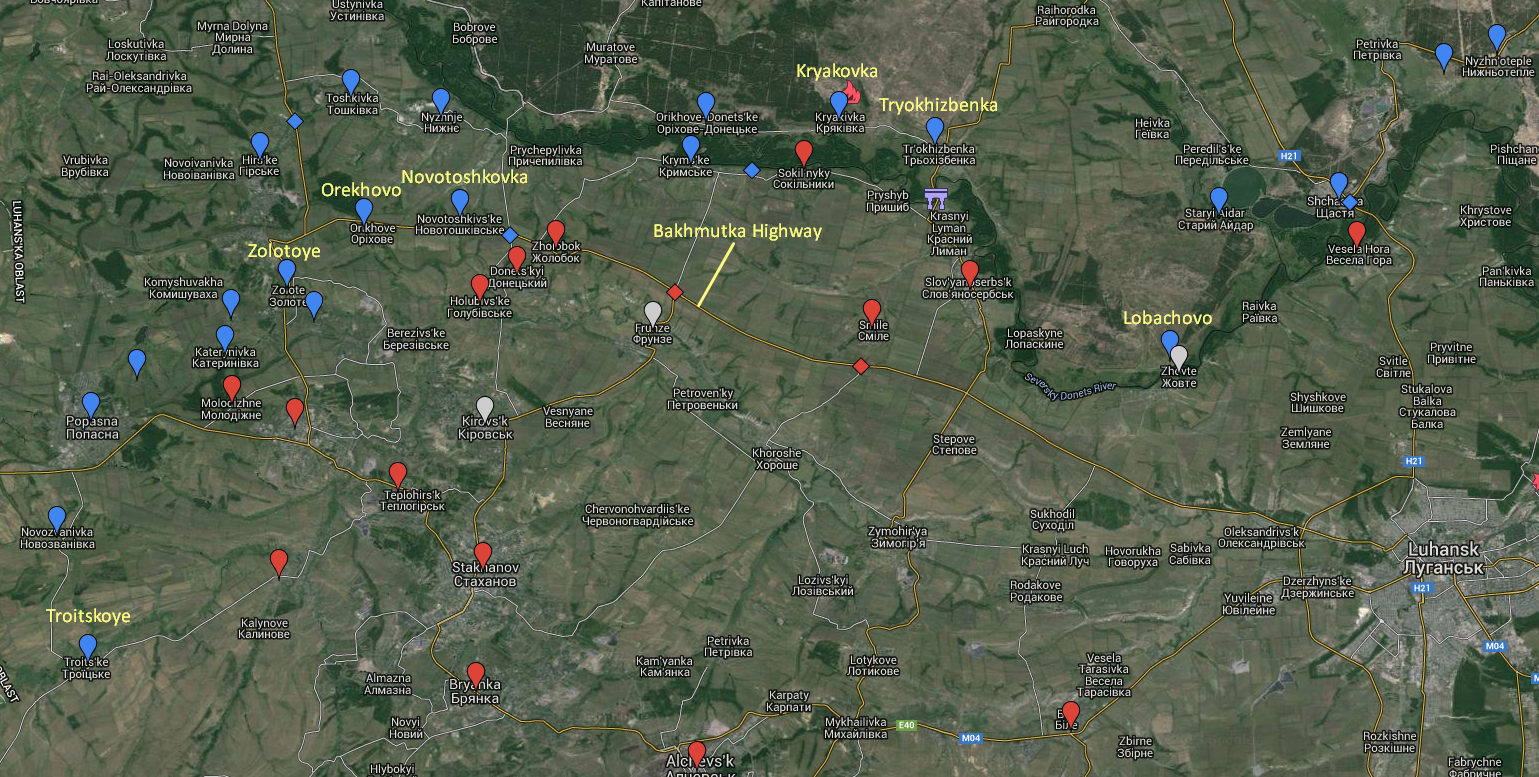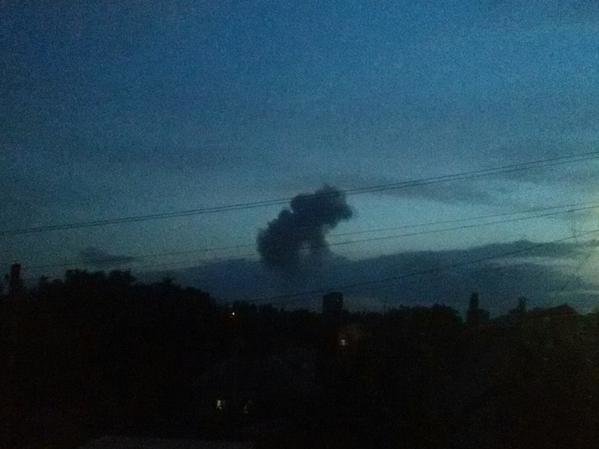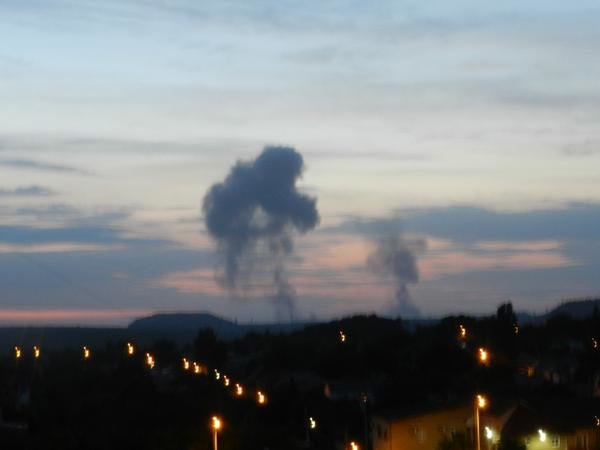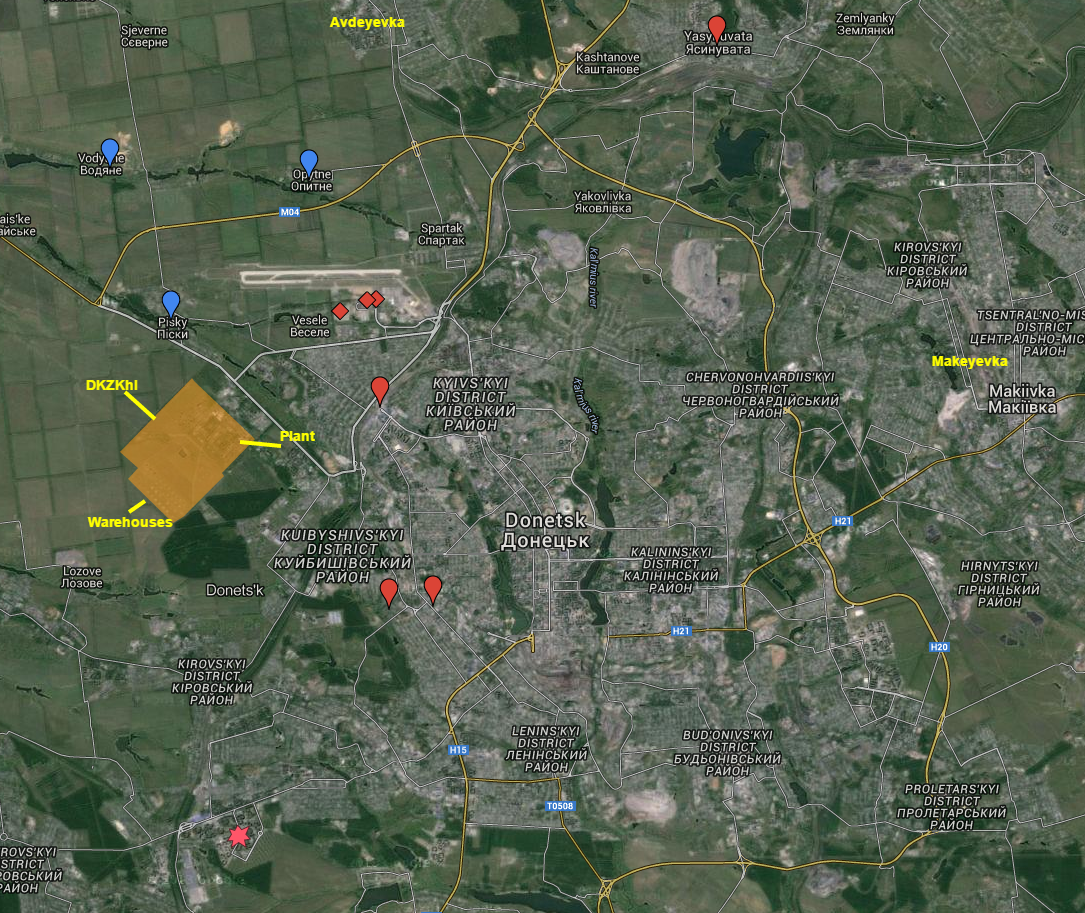Yesterday’s live coverage of the Ukraine conflict can be found here. An archive of our liveblogs can be found here. For an overview and analysis of this developing story see our latest podcast.
Please help The Interpreter to continue providing this valuable information service by making a donation towards our costs.
For links to individual updates click on the timestamps.
For the latest summary of evidence surrounding the shooting down of flight MH17 see our separate article: Evidence Review: Who Shot Down MH17?
Zoryan Shkiryak, advisor to the Ukrainian Interior Ministry, says that Russian military and mercenaries, including Chechens and GRU spetsnaz are once again launching an attack on Marinka, Ukrainska Pravda reports.
According to his report on Facebook, the Russian forces are firing from heavy artillery, self-propelled weapons, tanks, Gvozdiks, Rapirs, (anti-tank guns), and 120-mm mortars with cluster bombs. Translation by The Interpreter:
War with Russia. Sector “B”. At 23.40 another attack began by Russia-terrorist gangs on the positions of the ATO forces in Marinka. Terrorists attacked with heavy artillery, with everything they have. They are using TANK DESTROYER, tanks, “Rapier”, Gvozdiki and 120 mm mortar launchers with cluster bombs. In addition, the militants are engaged in attempts to break through their infantry into our territory. Among the enemy forces are mercenaries and soldiers of the ARMED FORCES of the RUSSIAN FEDERATION. In particular, there are Kadyrovtsky and GRU spetsnaz. However, the 28th, 20th, and 93rd brigades of the Ukrainian Armed Forces, as well as the soldiers of the National Guard and Interior Ministry bravely hold our positions, returning hard and repelling all terrorist attacks. The enemy has suffered significant losses in personnel and army. The confrontation continues. The warriors of light do not retreat!
This current attack follows a Russian-backed offensive on June 3. At least 5 Ukrainian soldiers were killed and 39 wounded, 5 civilians were killed
The link is to a post dated June 18 at the VKontakte group “Novorossiya Militia Dispatches” which states (translation by The Interpreter):
18.06.15. Report from Yegor Zemtsov.
The militia have fired on Ukrainian artillery men near Marinka. The henchmen lost 12 fighters.
“Donetsk is once again under fire from the UAF [Ukrainian Armed Forces]. In the LNR [Lugansk People’s Republic], Ukrainian forces have been firing on the village of Sokolniki. The UAF has deployed another 40 units of armor and 300 new recruits to the front line outside of Donetsk. To the West, the Ukes have crawled from the left flank, breaking through to Aleksandrovka. There are losses at Yasinovata. Our [positions] were fired on from all forms of weapons.”
A report from a militiaman with the call sign “Cheburashka”: “Donetsk. Looks like they began working Spartak hard. The Ukrop are trying to attack from Marinka as usual…Firearms, mortars. Avdeyevka/Spartak. Firefight already under way for 4 hours. From AK to Utesov. The Ukr self-propelled weapons are working. Peski/Zhobunki. Firefight, mortar launchers firing. The Ukropy are working hard on Donetsk! Well, give proper return fire on the svidomity, anybody, eh?
Ukropy (“dillweed”) and svidomoty (“enlightened”) are pejorative Russian word for Ukrainians.
The casualties have not yet been confirmed.
— Catherine A. Fitzpatrick
Pavel Kanygin, a war correspondent for Novaya Gazeta who was arrested by separatist forces yesterday, has submitted to a drug test and published the negative results in order to oppose the claim made by the self-proclaimed “Donetsk People’s Republic” agents, his newspaper reported.
Yesterday June 16 as we reported, Kanygin was detained by DNR forces, beaten, and interrogated and accused of being an agent of the US State Department and the Ukrainian government. A business card of a Ukrainian journalist among his belongings was used to make the charge.
DNR militants claimed that Kanygin was “a drug addict” and did work for the US government and was “paid in drugs.” The US government has nothing to do with Novaya Gazeta, one of the few remaining independent online news media in Russia.
— Catherine A. Fitzpatrick
Ukrainska Pravda reports that a source in the Presidential Administration has told them that the dismissal of the head of the Ukrainian Security Service (SBU), Valentyn Nalyvaichenko, will be considered tomorrow.
Under the Ukrainian constitution, the president must appoint or dismiss leaders of the SBU. The Rada must then confirm the decision.
As of 12:50 (9:50 GMT), no motion on the dismissal of Nalyvaichenko had been put to the Verkhovna Rada.
Yesterday, MP Mustafa Nayem, a member of Petro Poroshenko’s party, told journalists that the president was dissatisfied with Nalyvaichenko’s work over the past year.
“We listened to the president, who said that within a year Nalyvaichenko didn’t fulfill the tasks set by the president. They had a conversation over this issue, after which Mr. Nalyvaichenko agreed to head External Intelligence Service,” Nayem told journalists in the lobby of the Verkhovna Rada on Tuesday.
However, Nayem said it is too early to speak about Nalyvaichenko’s resignation as there has been no call for it yet.
“We will consider it after it is introduced,” Nayem said.
On June 15, Oleh Lyashko, leader of the Radical Party, had claimed that Poroshenko would indeed propose Nalyvaichenko’s dismissal, claiming that Vasyl Hrytsak would be nominated as his replacement. Hrytsak is currently the first deputy head of the SBU.
Interfax-Ukraine noted that the leadership of the SBU had recently become embroiled in a libel dispute over comments made about the ownership of the BSRM oil depot near Kiev, which caught fire on June 8:
SBU spokesman Markiyan Lubkivsky earlier wrote on Facebook that Nalyvaichenko would not travel to the U.S. to meet with U.S. congressmen on June 16 and 17 as planned, as he had received summons from an investigator of the Ukrainian Prosecutor General’s Office (PGO) in reaction to his statement at the latest Cabinet meeting about the involvement of the former PGO chiefs in the fire at the BRSM oil depot.
Nalyvaichenko previously said that the former deputy prosecutor was a co-owner of the BRSM-Nafta oil depot.
Before visiting the PGO on Monday, Nalyvaichenko named that former deputy prosecutor, saying it was Anatoliy Danylenko.
Danylenko in turn told TSN news service and Channel 5 that he was going to sue Nalyvaichenko over the lies.
— Pierre Vaux
Ukraine’s President Petro Poroshenko has met the former British prime minister, Tony Blair, and invited him to work with the Ukrainian Advisory International Council of Reforms.

An announcement on the president’s website stated that the two held a meeting in Kiev today.
The President has drawn special attention to the developments in Ukraine, which is on object of Russian aggression. The Head of State has emphasized that Russia, which had been a guarantor of the Budapest Memorandum and the global security system, had grossly violated the international law. He has also stressed that the UK, France and the U.S. must continue being guarantors of Ukraine’s security. Particularly, they should help our state in the enhancement of its defense capacity.
Petro Poroshenko is proud that Ukraine is currently united as never before and Ukrainians demonstrate their commitment to the European choice. “Despite war, we have an opportunity to implement reforms,” the President said. The Head of State has particularly noted the volunteer movement spread all over Ukraine. “Everyone is doing everything possible today to support the country in times of trouble,” the President emphasized.
In his turn, Tony Blair expressed firm support for Ukraine, its independence, sovereignty and territorial integrity. “You are now facing great challenges in the spheres of security and reforms,” he said.
The British politician emphasized that the world community had a great desire to support Ukraine and asked the President what practical international assistance was necessary for Ukraine. “It is an approach of a true friend of Ukraine,” the President answered.
Petro Poroshenko recalled that in the course of the Orange Revolution in 2005, Tony Blair had stated that Ukraine would be an EU member.
The Head of State has noted that the Eastern Partnership Summit in Riga had provided the first practical confirmation of the European solidarity for Ukrainian citizens and eliminated political obstacles on the way to the visa-free regime with the EU.
Tony Blair has praised the actions of President Poroshenko in the current difficult situation.
Petro Poroshenko invited Tony Blair to share his experience of public administration within the Advisory International Council of Reforms under the President of Ukraine.
Blair spoke today at the Zavtra Youth Forum, an annual event organised by Ukrainian oligarch Victor Pinchuk.
In February, The Sunday Telegraph reported that Pinchuk had donated $500,000 to the Tony Blair Faith Foundation, noting that this made up a fifth of all the donations declared in the Foundation’s latest accounts.
The article notes:
In return, Mr Pinchuk’s generosity has not gone unrewarded. In October last year, Mr Blair undertook an official tour of his new steelworks in Dnipropetrovsk, Ukraine’s fourth largest city, 280 miles from the capital Kiev. Mr Blair, who can be paid as much as £200,000 for a speech, did not receive any money for the visit to the Interpipe Steel works.
Photographs that show Mr Blair touring the factory with his host have been posted on Mr Pinchuk’s company website. The photographs show a grinning Mr Blair signing a hard hat and presenting it to a grateful Mr Pinchuk.
On the Interpipe Steel website, the company declares: “The public figure has managed to see live the modernisation and development of the Ukrainian metallurgy.”
Mr Blair is quoted on the website saying: “Interpipe Steel is undoubtedly an outstanding creation. This is one of the best and most modern mills in the world. I am greatly impressed with the spectacular and almost fantastic design of the facility.”
While he was there, Mr Blair also gave a lecture to university students and staff from Mr Pinchuk’s factory entitled “modernising countries in [the] 21st century”.
— Pierre Vaux
In addition to the attacks on Marinka last night, Ukrainian official sources claim that Russian-backed forces conducted attacks on other key areas of the front yesterday.
The Ukrainian State Border Service reported today that Russian-backed forces had attacked one of their checkpoints in the village of Zolotoye, in the Lugansk region.
According to the report, the checkpoint was attacked with automatic grenade launchers and small arms. Ukrainian forces returned fire.
This morning, the ATO Press Centre reported 58 attacks over the previous 24 hours, 40 of which occurred during the night. 16 were conducted with mortars, 30 with 122 mm howitzers.
According to the report, 122 mm howitzers were used against the villages of Orekhovo and Novotoshkovka, near the Bakhmutka highway, while 120 mm mortars were fired on Zolotoye and rocket-propelled grenades on Tryokhizbenka.
In Troitskoye, north-east of Debaltsevo, Ukrainian positions were attacked with 120 mm mortars. The village itself was shelled by tanks and with Grad rockets, fired from a single-tube launcher.
The governor of the Lugansk region, Hennadiy Moskal, noted that there were no Ukrainian military forces inside the village of Troitskoye, only outside it.
He appealed to the heads of the Ukrainian Security Service (SBU) and Interior Ministry to strengthen their efforts against enemy sabotage-and-reconnaissance teams (DRG), whom, he claimed, have intensified their activities in recent weeks.
Only in the last 24 hours, Moskal reported, such groups had set tripwires and explosives, and attacked Interior Ministry troops.
In Novotoshkovka, a civilian was blown up by a tripwire mine, set, the governor claimed, by an enemy DRG.
In the village of Kryakovka, an infantry fighting vehicle was damaged by an explosive device placed on the roadside, leaving two soldiers severely wounded.
At 17:00 yesterday, Russian-backed fighters fired on Interior Ministry troops on the road between Tryokhizbenka and Lobachovo. Three servicemen were taken to hospital with severe burns.

Meanwhile, to the south of Donetsk, the ATO Press Centre reported that the village of Starognatovka, east of Volnovkaha, had been shelled by tanks and 120 mm mortars.

The Mariupol Defence Headquarters announced today that the Ukrainian military “confirms reports of a distinct build-up of enemy troops in the vicinity of Granitnoye.”
We discussed the strategic significance of this area and the implications in a Russian escalation there a week ago:
In Shirokino, around 10 kilometres east of Mariupol, the Ukrainian military reported seven attacks over the past 24 hours.
The Mariupol Defence Headquarters claimed that one attack had been conducted with 122 mm artillery, two with 82 and 120 mm mortars, and four with small arms.
Last night, the report says, there were three small-arms attacks on Ukrainian positions in the village.
The military reported no casualties in the Mariupol area.
— Pierre Vaux
An enormous plume of smoke rose above the separatist-held city of Donetsk last night after residents reported a powerful blast from the direction of the Donetsk State Chemical Products Factory (DKZKhI).
Donetsk news site 62.ua reported that the explosion had occurred at around 21:00 and was heard across the entire city.
Residents reported seeing a brilliant flash before the explosion, which sent a blast wave powerful enough to slam windows in the city centre.
62.ua posted photos taken from social media:



Ivan Prikhodko, the separatist-backed head of the Kuybyshevsky district administration, told Interfax that the explosion had occurred at DKZKhI.
Interfax reported that, according to preliminary reports, a fire had broken out at the plant.
Today, the ‘defence ministry’ of the self-proclaimed Donetsk People’s Republic (DNR) claimed that the explosion had in fact been caused by Ukrainian shelling.
The ‘ministry’ told the pro-separatist Donetsk News Agency (DAN) that Ukrainian forces had fired two 82 mm mortar rounds into Donetsk last night, one of which struck an explosives warehouse at DKZKhI.
Ukrainian analyst Artyom Vasilenko, claimed on his Facebook page last night that the blast was unlikely to have been the result of a Ukrainian strike but rather an accidental detonation after the warehouses had been stocked-full with powerful explosives, freshly delivered from Russia.
Vasilenko wrote that Ukrainian intelligence reported that they had heard soldiers in Volgograd discussing the delivery of weaponry to Ukraine, designed to penetrate underground command posts.
Igor Ivanov, a member of the Russian-backed Vostok Brigade went today, with a camera crew from a separatist YouTube channel, to document the site of the explosion.
According to the Vostok Brigade’s VKontakte post, the crater at the epicentre of the blast has a diameter of over 30 metres and a depth of around 10 metres.




The area visible in the footage does resemble that seen in geotagged photos of the DKZKhI warehouse complex on Panoramio:


While it is likely that the crater is indeed at the DKZKhI site, we cannot say whether it is the result of last night’s blast as the chemical and explosives manufacturing plant has been rocked by two other enormous explosions – one on February 9 this year, and another on October 20, 2014.

Andriy Lysenko, then spokesman for the Ukrainian National Security and Defence Council, claimed that the October blast had been caused by an accident during explosives manufacturing.
The Russian-backed separatists, however, claimed that Ukraine had conducted a ballistic missile strike on the site.
That explosion was immensely powerful. The shock wave even caused part of the façade of the Donbass Arena football stadium, in the city centre, to collapse.
Once again, after the February blast, the separatists claimed that Ukraine had conducted a strike on the site, adding that old explosives had subsequently detonating. Meanwhile Dmytro Yarosh, leader of the ultra-nationalist Praviy Sector, claimed that Ukrainian forces had in fact struck a large accumulation of Russian Grad MLRS and ammunition stored in warehouses.
Here is footage of that blast:
— Pierre Vaux
The Ukrainian military’s ATO Press Centre reports that Russian-backed forces assaulted the Donetsk suburb of Marinka twice last night.
The Interpreter translates:
After midnight an assault group of around 30 militants attacked our positions in the Marinka area without success.
Later on, under cover from 120 mm mortars, another pro-Russian armed group, of no less than 150 criminals, made another assault on our positions. Reports on the results of the clash and the losses from both sides are yet to be confirmed…
Before the attempted breakthrough, Marinka was shelled with 120 mm mortars and tank weaponry.

Nikolay Kolesnik, the ‘curator’ of the Kryvbas volunteer Battalion, wrote on his Facebook page at 7:17 GMT (translated by The Interpreter):
Marinka. Battle last night. Two waves of attacks. The enemy, using 120 mm mortars, attacked the outermost defensive positions of the 20th Battalion. The first wave was repelled, the enemy regrouped, intensified their artillery bombardment. There was a second attempt at a breakthrough. The lads held their ground, 10 were wounded, some seriously.
They need a medical transport, armoured, for evacuating the wounded from the front line. Over three days one soldier has been killed and 24 wounded. Tatiana Guba is already meeting the wounded in Dnipropetrovsk.
Help is needed in replenishing manpower, to replace those withdrawn as a result of fighting and wounded soldiers. Every day, as if timetabled, there are enemy attacks. The enemy is taking heavy losses. The order is not to give the enemy their dead, only to exchange them for prisoners.
This is the third assault on the Ukrainian-held suburb, south-west of Donetsk, this month.